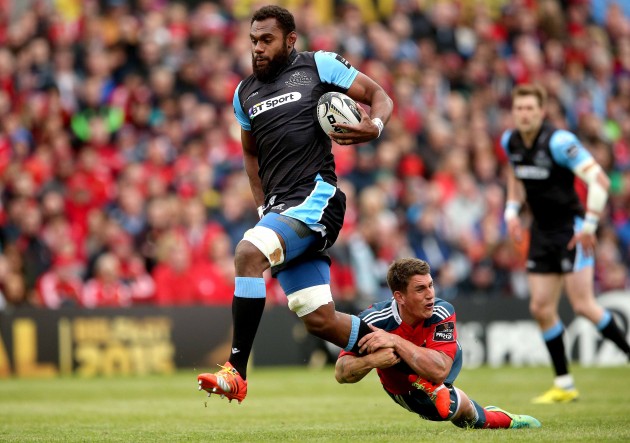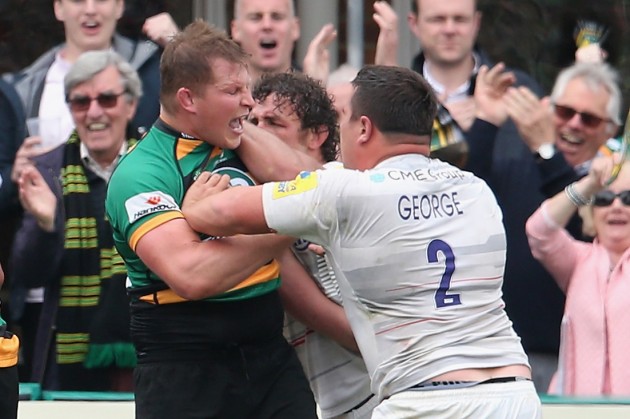Fun rugby, viscious foul play and departing deities come under the microscope this month...
Beautiful rugby is back
Rugby has become a rather routine affair over the past five years, with hyper-organised defences creating largely risk-averse attacking strategies led by tactical kicking. But thankfully, May was different, and we start our Five Things on a positive note…
Led by Glasgow Warriors, Bath and the Hurricanes, rugby put its ‘boots’ away for four weeks and brought out its ‘jazz hands’. Admittedly, Bath didn’t quite manage to perform in the Aviva Premiership final, but combined with the new Guinness Pro12 champions, and the leaders of Super Rugby, they proved that an open passing and running game can be hugely effective. It is exactly what rugby requires and will hopefully inspire the next generation of coaches to at least try more expansive strategies. Coaches like Mike Ford, Gregor Townsend and Chris Boyd, combined with playing talent like the Canes’ Nehe Milner-Skudder, Glasgow’s Leone Nakarawa and Bath’s Jonathan Joseph should be praised for what they do, not what they don’t. It’s this desire to play attractive, effective rugby that will ensure rugby’s long-term appeal is in safe hands – or in one glorious safe hand in Nakawara’s case.
Huget gets away with it
You can be forgiven for not seeing Yoann Huget’s disgusting stamp on the face of Bordeaux’s lock Jandre Marais; as you’re not the only one.
It would appear that the referee and the League Nationale de Rugby’s citing commission missed it too. It is the worst stamp that I have seen since the game turned professional and has absolutely no place in rugby. It is the sort of footwork that you see in a zombie film when a man his trying to shake a member of the undead from his ankle. It would be slightly more understandable if it had been done by one of rugby’s hard men – at least you could blame it on a rush of rage. But this is a player who received a warning for play acting against Bath back in January.
The closing of the citing window is also a weak excuse for not punishing Huget. If you kick a man in the face, in the street, you don’t escape punishment because the ‘GBH window’ has closed. If this is the case then the window needs to be re-opened and slammed down hard on Huget. That stamp was not accidental and is a serious contender for a 52 week ban, let alone missing the Rugby World Cup.
Paul O’Connell’s last game for Munster
May saw Paul O’Connell probably play his final game for Munster. There was no fourth league title for O’Connell as Munster were soundly beaten in the Pro12 final by a magnificent Glasgow performance. However, that one performance is a mere freckle on a blemishless Munster career that has seen O’Connell become, and remain, one of the finest players in the history of European club rugby. The word legend doesn’t seem quite grand enough for a player of his stature.
‘Legend’ has become a word used to describe a mate who can eat three Naga Ghost chillies whilst running naked through a shopping centre. O’Connell is totemic; he is Munster. A player whose mastery of rugby’s basics has allowed a generation of Munster players and supporters to enjoy one of the most glorious periods in the Irish club rugby, including two European Cups and three league titles. O’Connell’s domination of Europe may have come to an end in Southern Ireland, but is highly likely to continue in Southern France. His move to Toulon has yet to be confirmed, but if and when it is, his domination of club rugby will continue for at least another two seasons. Bon Voyage Mr O’Connell.
British & Irish Cup changes in Wales
May saw Welsh rugby posit changes to the way it approaches the British & Irish Cup in a move that would see Regional ‘A’ teams being entered into the competition as opposed to teams from the Welsh Premiership. The issue has caused a big stir in the Welsh Valleys and particularly with Pontypridd RFC who have enjoyed reasonable success in the tournament and view it as their ‘European’ competition. However, whilst it is easy to sympathise with Pontypridd RFC, the decision to alter the qualification process must be based on what is good for Welsh rugby. There is a clear performance gap between Wales’ professional teams (regions) and the league below. The national team is at the top of the performance pathway and all players and processes need to be focused in that direction. Whether the decision is taken to enter ‘A’ teams into the British and Irish Cup remains to be seen, but it is absolutely the correct decision for Welsh rugby as a whole.
Hartley future in doubt – in more ways than one
May saw Dylan Hartley receive yet another four-week ban and add to a list of offences more akin to a 1950’s mobster than a professional rugby player. Hartley has now added head-butting to a rap sheet that includes eye gouging, biting and elbowing. This inability to remain calm on the field has already crippled Hartley’s career and has meant that he will soon have been banned for over 54 weeks – an embarrassing record for such a good player to have to his name.
Having already missed a British and Irish Lions tour, he has now also been omitted from England’s Rugby World Cup squad. But Hartley’s actions may have ramifications beyond the pitch. Whilst rugby players earn very good money, many still need to work after retirement, of which sponsorship and corporate speaking often provide good income. Hartley isn’t exactly a good fit for many commercial brands – Lonsdale being an exception to the rule – and the after dinner circuit is more lucrative for those have featured in Rugby World Cups and Lion’s tours.
Hartley’s short fuse has already caused his career immeasurable damage in the short-term, but the financial consequences could extend way beyond his playing career.






